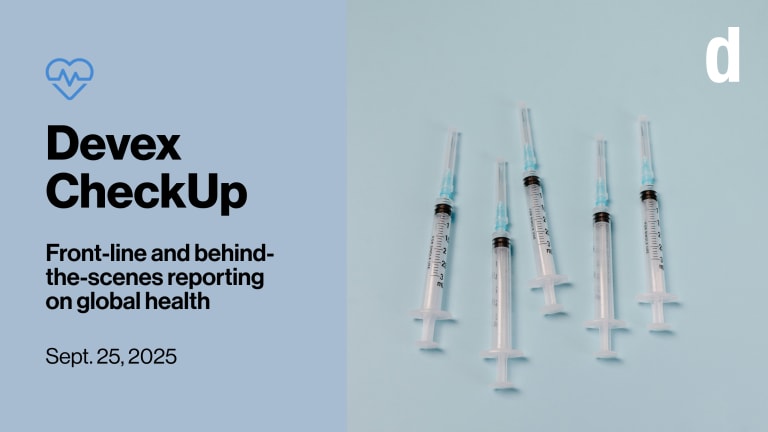
BERLIN — The chronic issue of drugs being priced at a level that puts them out of reach of countries in the global south — leaving patients unable to access life-saving medications — jumped in the headlines again last week.
Activists from Médecins Sans Frontières and tuberculosis patient organizations disrupted the opening of the Union World Conference on Lung Health in Hyderabad, India, demanding lower prices for three new medicines to treat drug-resistant TB.
James Love, director of Knowledge Ecology International, has been at the forefront of this debate for years, playing a key role in reducing drug prices for HIV patients across the global south. The nonprofit organization KEI takes a social justice approach to looking at the way knowledge resources are managed.
“Cell and gene therapies — we think that's where medicine's heading.”
— James Love, director, Knowledge Ecology InternationalLove spoke to Devex on the sidelines of last week's DNDi and Founders' Symposium in Berlin about the systems that elevate drug prices and what could be done to bring those prices down.
This conversation has been edited for length and clarity.
What is the situation when it comes to price of medicines in the global south at the moment?
The dynamics haven't changed that much in the past 50 years, [from] the post-war period where you see the steady upward trend in how aggressive pricing is for drugs. All these measures to lower prices — like having open licenses or medicines patent pools or compulsory licensing or price negotiations — they all have some positive benefits, as far as you can be successful. In some cases, even the possibility of success might moderate the demands. But your ambition's always limited.
Deal slashes preventive TB medicine price by nearly 70%
Sanofi is slashing the price of its preventive TB drug rifapentine, making it more affordable and accessible to individuals with latent TB infection in 100 countries.
What you have now is really decades and decades in changes of international treaties and patent rights and regulatory systems ... You come in and say, “I want to do things differently,” and people say, “It's going to be hard, so we shouldn't do it. It's going to take a long time.”
Well, it's true, the current system is hard. The current system's really complicated. You can't just wave a magic wand and say “companies, stop trying to make money.” You have to deal with the fact that you've created a system where the people running the companies get removed from their jobs if they don't provide the right kind of returns.
That said, I think success begets success in some of the short-term strategies. So if you want to grant a compulsory license on some of the patents [when a government allows someone else to produce a patented product without the consent of the patent owner, or plans to do so itself], it could be good if there were successful cases.
Countries like to copy each other. No country wants to be seen as the leader on attacking the intellectual property system. They want to be following someone else's lead or conforming to some broader norms. The more frequently you can grant compulsory licenses, the easier it is for every country to do it.
What are the challenges to getting compulsory licenses?
If you were to go to some developing country and say I'd like to do a compulsory license on a tuberculosis drug, they wouldn't really know what to do. There are some exceptions, but even then, if they've never done it before, we have to consult with the cabinet. We have to talk to the president. All these things have to be talked through.
“What you don't have is good data on the cost of the trials. To me, that's ridiculous, for ... life or death matters.”
—You've advocated for the importance of transparency around the cost of drug trials. Why is this important?
We put a lot of emphasis on transparency. I think that any kind of reforms you want to do on pricing, intellectual property rights, new innovation models, the fact that nobody can agree on the facts is a problem.
People say it's risky. One positive thing is you have fairly good data on the risk. You have good data on how many drugs go from phase 1 to phase 2, for instance, because it's a regulated industry.
What you don't have is good data on the cost of the trials. To me, that's ridiculous, for ... life or death matters like this. These huge disputes over pricing [and] life-saving drugs not being on the market — there's so much riding on these decisions. How could you be just allowing the companies to make up fairy tales about these things?
What is the solution?
What we'd like to do is just have governments move toward more transparency on the cost of everything. The cost of manufacturing cells. The cost of conducting vaccine trials. Just so that whenever you have a debate, at least you're not arguing about facts. You're arguing about how you interpret the facts or how much you think you're willing to pay for innovation.
It's not in the public's interest to have confusion about things that are knowable. Some things are hard to know, but for some things, it’s a matter of policy whether you know them or not.
What are other access issues you're paying attention to in low- and middle-income countries?
Cell and gene therapies — we think that's where medicine's heading. The public funding role is huge, in terms of looking at science and the [intellectual property] rights. The pricing is super aggressive. But quite a few countries have laws in the books that say you can actually be patent-free in that zone or for significant components of it. And some countries are moving in that direction.








